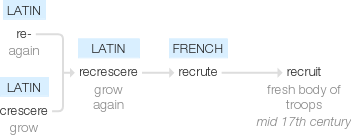Recruit
mid 17th century (in the senses ‘fresh body of troops’ and ‘supplement the numbers in a group’): from obsolete French dialect recrute, based on Latin recrescere ‘grow again’, from re- ‘again’ + crescere ‘grow’.
wiktionary
From French recruter (as a verb).
etymonline
recruit (v.)
1630s, "to strengthen, reinforce, repair by fresh supplies," from French recruter (17c.), from recrute "a levy, a recruit" (see recruit (n.)). The sense of "to enlist new soldiers" is attested from 1650s, hence "gain new supplies" of anything, for any purpose (by 1660s); specifically of student athletes by 1913. Of troop units or classes, "supply with new men, reinforce," 1770s. Related: Recruited; recruiting.
recruit (n.)
"military reinforcement, one of a newly raised body of soldiers or sailors to supply a military deficiency," 1640s, from recruit (v.), replacing earlier recrew, recrue; or from obsolete French recrute, alteration of recreue "a supply," recrue "a levy of troops" (late 16c.). This is a Picardy or Hainault dialect variant of recrue "a levy, a recruit," literally "a new growth," from Old French recreu (12c.), past participle of recreistre "grow or increase again," from re- "again" (see re-) + creistre "to grow," from Latin crescere "to grow" (from PIE root *ker- (2) "to grow").
"The French word first appeared in literary use in gazettes published in Holland, and was disapproved of by French writers in the latter part of the 17th c." [OED]. The French word also is the source of Dutch recruut, German Recrut, Swedish rekryt. The general sense of "one who has newly filled a vacancy in any body or class of persons" also is from 1640s.
